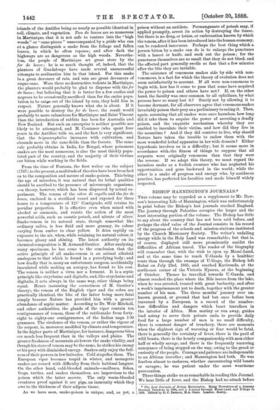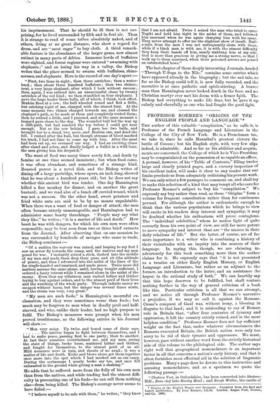. BISHOP HINNINGTON'S JOURNALS.*
THIS volume may be regarded as a supplement to Mr. Daw- son's interesting Life of Hannington, which was unfortunately in print before the Bishop's last journals reached England. The journey through Palestine occupies the larger and the least interesting portion of the volume. The Bishop has little to say about the country that has not been said before, and perhaps the chief value of the Journal consists in his record of the progress of the schools and mission-stations instituted by the Church Missionary Society. The writer's unfailing energy while in the Holy Land was remarkable; but that is, of course, displayed still more prominently amidst the difficulties of African travel. The reader of the biography will remember that, with the wish to open up Masai-Land, and at the same time to reach U-Ganda by a healthier route than through the swamps of 13-Gogo, the Bishop left Rabai on July 23rd, 1885, and reached Kavirondo, at the north-east corner of the Victoria Nyanza, at the beginning of October. Thence he travelled towards U-Ganda, and almost reached the place where the Nile issues from the lake, when he was arrested, treated with great barbarity, and after a week's imprisonment put to death, together with the greater number of his men. The three months' journey over un- known ground, or ground that had but once before been traversed by a European, is a record of the number- less difficulties and dangers which beset travellers in the interior of Africa. Men mutiny or run away, guides lead astray to serve their private ends, to provide daily food for a large number of men is no small difficulty, there is constant danger of treachery, there are moments when the slightest sign of wavering or fear would be fatal, there is generally the certainty of fever, there is the peril of wild beasts, there is the hourly companionship with men either half or wholly savage, and there is the frequently recurring annoyance of being stopped on the way, owing to the greed or curiosity of the people. Courage and patience are indispensable to an African traveller; and Hannington had both. He was fearless almost to rashness, whether encountering wild beasts or savages ; he was patient under the most wearisome provocation.
Three things strike us as remarkable in reading this Journal. We hear little of fever, and the Bishop had no attack before
• The Last Journals of Bishop Hennington. Being Narratives of a Journey through Palestine in 1884, and a Jairney through Masai. Landand 1:143ogn in ISM F.dited by B. e. Dawson, M.A.. Oxon. London: Seeley. his imprisonment. That he 'Should be ill then is not sur- prising:for he lived surrounded by filth and in foul air. Then it is strange to read of some tribes absolutely naked, and of
others, living at no great distance, who show a regard for dress, and are "most eager" to buy cloth. A third remark- able feature is the abundance of the larger game, now almost extinct in many parts of Africa. Immense herds of buffaloes were sighted, and forest regions* were entered " swarming with elephants ;" and on losing his way in a valley, the Bishop writes that the place seemed to swarm with buffaloes, rhino- ceroses, and elephants. Here is the record of one day's sport
First, two lions in sight ; then three ostriches ; then a water- buck ; then about three hundred buffaloes ; then two rhinos ; next, a very large elephant, after which I took without success ; then, again, I was enticed into an unsuccessful chase by twenty ostriches of the red kind ; we then stunibled on four elephants. I gave the huge leader three balls, all of which, I think, took effect. Brahim fired at a cow; the bull wheeled round and lied a little, but catching sight of me, charged with the utmost fury. At the same moment two rhinos charged towards me, and crossed the elephant's path, so he made at them and completely routed them; then he -retired a little, and I pursued, and at the same moment a leopard gave chase to the dog. The wounded bull led the way up a elift-path, but had reached the top before I could get near enough. Not so the cow behind. I gave her two balls, and brought her to a stand, two more, and Brahim one, and dead she fell. I rushed after the bull, but though streams of blood marked his track, I had not time to come up with him. After the meat had been cut up, we resumed our way. I had an exciting chase after eland and zebra, and finally lodged a bullet in a wild boar, the men giving him his despatch."
The want of food was many times sorely felt, and death by famine at one time seemed imminent ; but when food came, it 'was often abundant, and sometimes of a strange kind. Roasted parrot is a novel dish, and the Bishop writes of dining. off a large partridge, whose spurs, an inch long, showed that he was about a hundred years old; but he does not say
whether this ancient bird was tender. One day nannington killed a fine monkey for dinner, and on another the great bustard; and we read also of a lunch off carried weasel, which was not a success. On the other hand, sweet potatoes and fried white ants are said to be by no means unpalatable. When there was a want of food or danger of attack, the men often became utterly unmanageable, and Haamington had to administer some hearty thrashings. "People may say what they like," he writes ; "it is a matter of life and death." How beset he was with dangers, for which his own men were often responsible, may be beat seen from two or three brief extracts from the Journal. After observing that on one occasion he was surrounded by hundreds of savages who came to trade, the Bishop continues :—
" Of a sudden the war-cry was raised, and leaping to my feet I saw an arrow fly towards the camp, and the natives and my men posed for war. I instantly seized a stick, dashed into the middle of my men and made them drop their guns and sit (the attitude of peace), and then I advanced into the midst of the lines of the foe single-handed and unarmed, and made peace. Twice more did matters assume the same phase, until, having bought sufficient, I ordered a hasty retreat while I remained alone in the midst of the enemy. Even then my villainous men rushed hither and thither trying to buy against orders, and to the utmost peril of their lives and the wrecking of the whole party. Through infinite mercy we escaped without harm, but the danger was -several times acute, and the strain was very, very great."
"My men are such fools," is Hannington's mournful ex- clamation, and they were sometimes worse than fools ; but much may be forgiven to men when in deadly peril and half- starved, and who, unlike their leader, had no high purpose to fulfil. The Bishop's measures were prompt when his men proved troublesome, as the following entries in his Journal will show:—
" Men very noisy. "Up twice and boxed some of their ears.
The natives began to fight between themselves, and I had to make peace, passing first to one party; then to another. At last their numbers overwhelmed me, and my men, seeing the state of things, broke loose, scattered hither and thither, and fought for themselves, to the utmost peril of us all. Mild measures were in vain, and shouts of no avail ; it was a matter of life and death. Kicks and blows alone got them together once more into the spot which I had marked out as our camp. During the scrimmage I nearly broke my toe, and once fell exhausted to the ground while giving a man a shaking."
He adds that he suffered more from the folly of his own men than from the natives, and while trading had the utmost diffi-
culty in preventing one of his-fools—he can call them nothing else—from being killed. The Bishop's courage never seems to have failed:— "I believe myself to be safe with them," he writes; "they know
that I am not afraid. Twice I seized the man who tried to spear Togiki and held him tight in the midst of them, and followed him unarmed when he was again charging him with his spear. They never attempt to offer me the slightest show of insult. Haif- a-mile from the men I was not unfrequently alone with them, while if a black man is with me, it is with the utmost difficulty they keep their hands off him, nearly stabbing him at my side. God is more than gracious in giving me a strong nerve, so that I walk up to them unarmed, when their poisoned arrows are poised on outstretched bows."
The last chapter of these deeply interesting Journals, headed "Through 13-Soga to the Nile," contains some entries which have appeared already in the biography ; but the sad tale, so far as the Bishop could tell it, is now fully recorded, and the narrative is at once pathetic and spirit-stirring. A braver man than Hannington never looked death in the face, and no Christian martyr ever met his doom with a firmer ftith. The Bishop had everything to make life dear, but he gave it up calmly, and cheerfully as one who had fought the good fight.
•



































 Previous page
Previous page